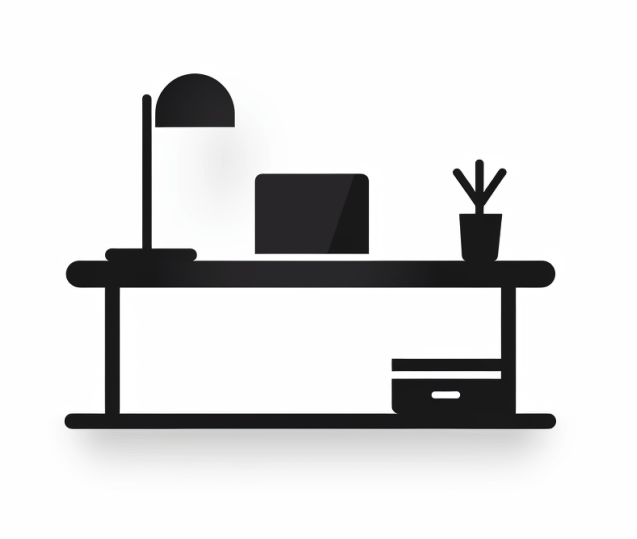Desktop feng shui is an ancient Chinese practice of organizing the environment around us in order to bring balance, harmony, and positive energy into our lives. From desk placement to mindful practices, here are some tips on how you can use desktop feng shui to create a work at home space that will help increase your focus and clarity while giving off good vibes.
Desk Placement
When it comes to desk placement, location is key. It’s important to find a spot that has enough natural light and air circulation so you can stay energized throughout the day. Avoid placing your desk in front of a window as this can be distracting when trying to focus on work tasks. If possible, try to place your desk in an area with minimal noise or distractions from family members or pets.
Direction also plays an important role when setting up your workspace. Facing north is said to bring good luck and success while facing east will help increase creativity and productivity levels. South-facing desks are thought to bring wealth and abundance while west-facing desks are believed to attract more opportunities for growth and development.
Height is another factor that should not be overlooked when creating the perfect desktop setup at home. Your chair should be adjusted so that your elbows rest comfortably at 90 degrees while typing on the keyboard or using a mousepad; if they don't reach this level, then adjust accordingly until they do. The height of your monitor should also be taken into consideration; ideally it should sit slightly above eye level so you don't have to strain yourself by looking down too much during long periods of time spent working from home.
Creating a well-balanced and energized workspace can be achieved by strategically placing your desk in the right location, direction, and height. To further optimize your home office environment, adding desk accessories like plants, artwork, lighting, and technology is key.
Desk Accessories
Not only do they look nice, but they also help to purify the air around you. Adding some artwork or decorations is another way to personalize your space and make it feel more inviting. Whether it’s a few pictures of family members or favorite quotes, these items will add character and color to your work area.
Lighting is an important factor when creating a productive workspace as well. Natural light sources are best for providing adequate illumination while avoiding eye strain from artificial lighting sources such as fluorescent bulbs or LED lights. If natural light isn’t available in your home office, consider investing in lamps that provide adjustable brightness levels for different tasks throughout the day.
Technology is also essential for any home office setup – monitors, laptops, tablets – whatever works best for you. But don’t forget about ergonomics; if you spend most of the day typing on a computer keyboard then invest in an ergonomic chair with lumbar support and adjustable armrests so that you can stay comfortable during long hours at the desk without straining your neck or back muscles.
Finally, mindful practices like meditation or relaxation techniques can help create a positive work environment by reducing stress levels and increasing focus throughout the day. Incorporating music into your routine can also enhance productivity; whether it's classical tunes playing softly in the background or upbeat pop songs while tackling tough projects - find what works best for you. Additionally, taking regular movement breaks is important too - stretching exercises every hour will keep those creative juices flowing.
Color Scheme and Aesthetics
When it comes to creating a workspace that is both aesthetically pleasing and conducive to productivity, color scheme and aesthetics are key. Choosing the right wall colors and paintings can help create an inviting atmosphere that encourages focus. Neutral tones such as light grays or beiges can provide a calming effect while still allowing for pops of brighter colors through artwork or other decorations. Furniture should be chosen with comfort in mind; ergonomic chairs, desks, and adjustable lighting are all important considerations when designing your home office space. Textiles such as rugs or curtains can also add color or texture to the room without overwhelming it.
Organization solutions like shelves, drawers, baskets, and bins are essential for keeping clutter off of the desk surface and making sure everything has its place. Consider investing in some stylish storage containers so you don’t have to sacrifice style for functionality. Labeling each container will make it easier to find what you need quickly when you’re in a rush - no more searching through piles of papers. Wall organizers with pockets or hooks are also great options if you want something more permanent than plastic bins but don’t have much floor space available.
Finally, adding plants into your workspace is another way to bring life into the room while improving air quality at the same time. Low-maintenance succulents require minimal care but will still give your office a touch of greenery without taking up too much space on your desk top - perfect for those who aren't green thumbs. Taking these steps towards creating an aesthetically pleasing work environment will not only improve productivity but also make working from home feel less like a chore and more enjoyable overall.
By combining the right colors and textures, you can create a peaceful workspace that is aesthetically pleasing and promotes productivity. To complete your home office's feng shui design, it is important to consider the natural elements in the space as well.
Air Quality and Ventilation
Good air quality is essential for a productive workspace. Make sure the room has adequate ventilation or use an air purifier if needed. This will help to keep your work area clean and free of pollutants, which can cause fatigue and headaches. Additionally, open windows when possible to allow fresh air into the space. Natural Light Sources
Natural light sources are beneficial for providing energy throughout the day. Positioning your desk near windows allows you to take advantage of natural sunlight during daytime hours while also enjoying views outside. If there isn’t enough natural light in the room, consider using lamps or other lighting options that provide similar benefits without straining your eyesight too muchBy incorporating natural elements into your workspace, such as air quality and light sources, you can create a more comfortable and productive environment. To further enhance the positive energy in your space, mindful practices such as meditation or movement breaks are beneficial to help achieve balance and focus.
Mindful Practices for a Positive Work Environment
Working from home can be both a blessing and a curse. On one hand, you have the freedom to create your own workspace and set up an environment that works best for you. On the other hand, it can be difficult to stay focused and motivated when there are so many distractions around. To help combat this, it’s important to take some time out of your day to practice mindful practices in order to create a positive work environment.
Meditation or Relaxation Techniques
Taking just five minutes out of your day for meditation or relaxation techniques can do wonders for reducing stress levels and improving focus. Whether it’s deep breathing exercises, yoga poses, or guided meditations – taking time away from work-related tasks is essential in maintaining mental clarity throughout the day.
Music or Sounds to Enhance Focus
Music has been proven to increase productivity by helping people concentrate better on their tasks at hand while also boosting mood levels. Listening to classical music or nature sounds like rainforest ambiance helps reduce stress levels while providing an uplifting atmosphere conducive for working efficiently without feeling overwhelmed by too much noise pollution in the background.
Taking regular breaks from sitting down is essential for maintaining good health, especially when working from home. It's important to get up and move around during breaks between tasks; this could be anything from stretching exercises, walking outside (weather permitting), or doing some light cleaning chores inside. Doing so will help break up long periods of sitting down, resulting in improved posture and increased energy levels throughout the day.
By incorporating these mindful practices into our daily routines, we can ensure that we remain productive while creating a positive work environment free from stressors such as excessive noise pollution or physical discomfort due to long hours spent sitting down at our desks.
Common Desktop Feng Shui Questions
Which way should your desk face for feng shui?
Feng shui is an ancient Chinese practice that seeks to create harmony and balance in the environment. When it comes to desk placement, the ideal direction for your desk should be facing a wall or corner with no windows behind you. This will help promote focus and concentration while also providing protection from external influences. Additionally, having a view of something calming like nature can bring peace and relaxation into your workspace. To maximize feng shui energy, make sure there are no sharp corners pointing at you when sitting at your desk.
What should you keep on your desk for good luck?
Having a few items on your desk for good luck can be a great way to stay motivated and inspired while working from home. Consider keeping an elephant figurine, which symbolizes strength and stability; a four-leaf clover, representing luck; or even a small Buddha statue, signifying peace and harmony. Additionally, you could place some crystals like amethyst or rose quartz around your workspace to bring positive energy into the area. Finally, don’t forget about scented candles – they can help create an inviting atmosphere that will make it easier to focus on work tasks.
Should your desk face a wall in feng shui?
No, according to the principles of feng shui, your desk should not face a wall. Instead, it should be placed in such a way that you can see the door from where you are sitting. This allows for good energy to flow freely into your workspace and helps create an environment conducive to productivity and success. Additionally, having plants or other natural elements nearby can help bring balance and harmony to your home office space.
Where should I put my feng shui computer?
When it comes to computers, the best place for your feng shui computer is in a spot that allows you to feel connected and energized while working from home. To achieve this, make sure your desk faces away from any windows or doors and towards a wall. Place the computer on the left side of your desk if you are right-handed and vice versa for left-handers. Also, ensure there’s enough space around it so that air can circulate freely and avoid clutter near it as much as possible. Finally, add some personal touches like plants or pictures to create a positive energy flow in the room.

